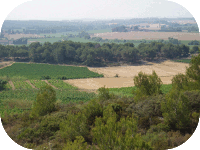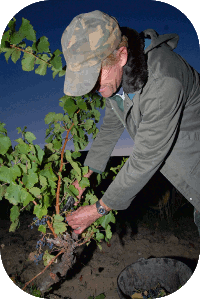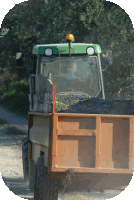Growing techniques

The land is suited in all respects to the growing of the vine (see Historic Summary). The composition of the soil is clay and chalk with an active limestone content of around 25%.
The higher slopes are more stony (rock outweighing the soil) forcing the vines to produce deep roots - several metres - to find water.
Yields do not exceed 40 hectolitres per hectare producing very complex wines with the aroma of the garrigue:
AOC (French top quality wines) Coteaux du Languedoc.
The middle and lower parts of the slopes are are considerably more fertile and have yields of around 60 hectolitres per hectare producing fruity and well-balanced wines:
Vin de Pays Coteaux de Bessilles.

All of the slopes have a full southerly exposure with stunning views to the Mediterranean. Situated at 10 kilometres from the sea the hills of la Briffaude represent the first natural obstacle for the sea breezes which carry the humidity necessary for the perfect ripening of the individual grapes.
The vineyards are planted to a density of 4000 - 5000 vines to the hectare.
The distance for supporting the vines varies between 1.5 and 2 metres depending on the grape variety.
Cépages (grape variety) are as follow:
 |
|
 |
|
Making and ageing our wines
The cave was rebuilt in stone and half-buried around 1880. This building style allows natural cooling of the cellar. The temperature of the vats is fully controlled by a heating/cooling system.

The grape harvest is pressed and destalked on arrival at the cave. The winemaking vats are traditionally constructed permitting release and pumping-over during the wine maling process. Devatting is done by hand. For the reds the time spent in vats is longer or shorter depending on the grape variety and the vintage. The rosÚs are made from free-run juice or by bleeding the grapes followed by strict control of fermentation temperatures. The whites are cold settled then fermented at 18░ C.

The wines are racked and aerated during the course of their ageing. As part of our pledge to our customers and as a guarantee of the quality of the ageing of the wine in the bottle, our wines are produced without any additives (tannins, wood chips etc) or any other mechanical treatment (tangential filtration, centrifugation, pasteurisation).




